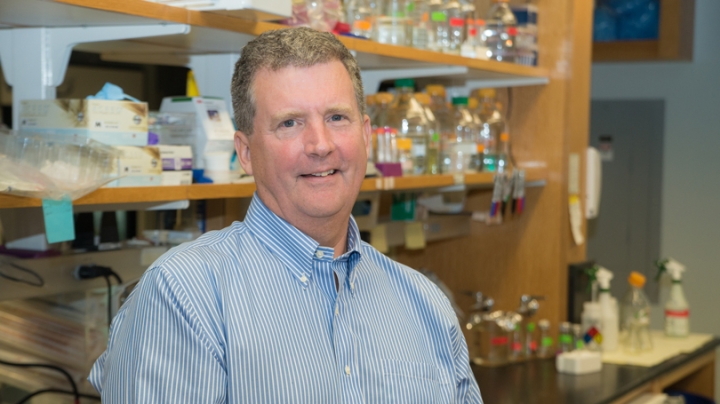This is the ninth in a series of profiles of the 10 new endowed professors in the arts and sciences.
Dale Mierke, the Frank R. Mori Professor in the Arts and Sciences
Dale Mierke is a professor of chemistry and chair of the chemistry department. His research focuses on determining promising molecules for therapeutic uses, particularly in treating cancer and addictions. A former Fulbright Scholar at the Technical University of Munich, Germany, he taught at the University of Massachusetts Medical School and Clark University before joining the faculty of Brown University in 1998, where he had held appointments in chemistry and molecular pharmacology. He came to Dartmouth in 2007.
What being named to this professorship means:
I don’t know if it’s sunk in yet. The best thing has been all the congratulatory emails I received from my colleagues. It’s recognition of what I’ve accomplished both as a scholar and educator, and in research. It’s just a great honor.
Current research interests:
My research is in designing drugs—molecules that might eventually become therapeutics. We use a technique called nuclear magnetic resonance, or NMR. It allows us to characterize which molecules are binding to a biological target, and then you can go into the lab and optimize them, synthesize them, test them. It’s an iterative process. In the basement of the Class of 1978 Life Sciences Center, I have an NIH-supported screening center where we use NMR to screen libraries of small molecules that bind to various targets. Unlike pharmaceutical companies, we can do the crazy thing, try the idea that has a very small percentage of working. Even if it fails, I’ve succeeded in teaching my students about the science and the whole pipeline of drug development. We can publish the work, so they have scholarly achievement.
On teaching:
I mostly teach introductory chemistry and advanced biochemistry, and I am a strong proponent of bringing the excitement of what I do into the classroom. Even for the introductory course, I take, for example, the HIV protease, which is a very well characterized molecule, and we use computer simulations to demonstrate fundamental physical forces. I can tell them, ‘OK, you come up with a problem—which protein would you like to inhibit?’ And we’ll see what the computer does. That allows the students to lead the discussion of the fundamental chemistry that I’m asked to teach.
Why Dartmouth:
I really like teaching at the undergraduate level. I like bringing undergraduates into my research and my research to the undergraduates. I also like the size of the faculty. We all interact with each other—we have to if we’re going to make a significant contribution to the science. I work very closely with a number of folks in the medical school particularly, as well as in the cancer center and engineering. I like the collegiality—that we work together and we have fun together. It’s a great community.
The Endowed Chairs
Since 1787, Dartmouth has recognized its top faculty with named professorships. These chairs—traditionally supported through endowed gifts from alumni, family, and friends of the College—honor faculty whose scholarship, teaching, and service exemplify Dartmouth’s core mission.
“Endowed professors reflect the best of Dartmouth,” says Dean of the Faculty Michael Mastanduno. “These scholars are not only at the top of their respective fields—they are generous and committed teachers and outstanding citizens of the College community.”
This year, 10 members of the Faculty of Arts & Sciences have been appointed to endowed chairs. In addition, the Tuck School of Business appointed Praveen Kopalle the Signal Companies’ Professor of Management; and Rahul Sarpeshkar joined the faculty this year as the inaugural Thomas E. Kurtz Chair in the William H. Neukom Academic Cluster in Computational Science, with a primary appointment at Thayer School of Engineering

